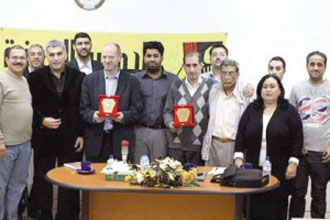
|
 |
 |
|
|
|
|
|
|
|
|
|
|
|
|
|
|
|
|
|
|
|
|
|
|
Why Bahrain Sends Wrong Message to INGOs?The recent visit of Front Line’s delegation to Bahrain on 11-14 January 2010 has shed light on the relationship between the Government’s apparatus and international organizations. The delegation was unable to meet the senior officials dealing with human right and complained
The Front Line delegation also met officials in the Ministry of Social Development in charge of civil society organizations where they discussed various issues. Mr. Anderson said that:’ we are very much disappointed as we were hoping to meet officials in the Ministry of Justice and Ministry of Interior’. He continued saying: ‘despite agreeing to the questions and issues that would be discussed with the officials in the Justice Ministry –a condition that was imposed on the organization before the meeting- in the end, we were unable to get a positive response which is disappointing’. Anderson also added: ‘unfortunately when we request information from the Government we do not receive a positive response or reaction’. This is surprising, as the Government does not usually restrict international organizations or their activities. These organizations do not require a visa to enter the country as it can be obtained at the airport. In addition to this, the organizations are not even expected to obtain permission from the Government in order to conduct their activities whether they relate to Bahrain or any country in the region. In fact, the Government invites Arab and international human rights organizations to visit Bahrain in order to meet officials to discuss human rights, participate in human rights related activities and share their experiences through seminars and workshops. We believe that what happened to Front Line was a result of bad management. However, this is not the only issue that bothers the international organizations; for there is also the issue of failing to respond to their enquiries and letters and provide them with the information. This has been a persistent problem since the beginning of the reforms and until this day. With regards to the issues related to the allegations of human rights violations, the Government has its own information regarding specific cases. However, it is not clear if the Government has decided to not communicate with these organizations due to its weak position, or, whether it wants to limit its contact with them. In most cases we do not think that either are the case. The real problem is the fact that there is no specific governmental body in charge of human rights in Bahrain, except the Foreign Ministry which deals with the Universal Periodic Review. Despite the fact that there is a committee in the Foreign Ministry, which is concerned with human rights, it did not meet Front Line. It is not also clear if this committee is responsible for the relation with the international human rights organizations or for responding to their enquiries. Therefore, what does the lack of response to Arab and international human rights institutions mean? It only affirms the allegations of human rights violations and harms Bahrain’s reputation by portraying it as a country which does not respect human rights and human rights organizations. Is this the message that Bahrain wants to send to human rights organizations? The communications problem with the international human rights organization needs to be seriously addressed and a solution needs to be provided by the Government which has been long overdue. |
